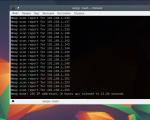License fee - features, size and requirements. License fees Regulation of licensing by law
Article 553. General provisions
1. This chapter establishes general provisions (principles) on the basis of which taxpayers, the object of taxation, the tax base and rates of regional license fees (hereinafter in this chapter - fees) are determined.
2. The specific procedure and conditions for payment of fees are determined by law adopted by the legislative (representative) authority of the subject Russian Federation.
Article 554. Taxpayers
1. Taxpayers of fees are recognized as organizations (Article 18 of this Code) and individual entrepreneurs ((Article 26 of this Code) who acquire from authorized regional bodies a special permit (license) provided for by the legislation of the Russian Federation to carry out licensed types of activities on the territory of a constituent entity of the Russian Federation.
Article 555. Object of taxation
1. The object of taxation and the tax base is the acquisition by a taxpayer of the right to carry out activities licensed in accordance with the legislation of the Russian Federation on the territory of a constituent entity of the Russian Federation.
2. Making changes to the license is equivalent to issuing a new license.
Article 556. Tax base
The tax base for establishing a regional license fee is determined based on specific type activities subject to licensing and the minimum monthly wage established by federal law.
Article 557. Amounts of license fees
1. For the issuance of a license to carry out types of activities established by the legislation on licensing, a license fee is charged in an amount not exceeding 500 times the minimum wage established by federal law.
The specific amount of the license fee is established by the government authority of the constituent entity of the Russian Federation.
2. For the issuance of a duplicate license, the taxpayer shall pay 50 percent of the amount of the regional license fee payable in accordance with part one of this article.
Article 558. Procedure and terms for payment of regional license fees
1. The regional license fee is paid by the taxpayer independently before receiving a license to carry out the relevant type of activity.
2. To obtain a license giving the right to carry out several types of activities, the taxpayer pays a regional license fee separately for the right to carry out each type of activity specified in the license.
3. Paid regional license fee is non-refundable.
4. The amount of the fee is paid to the budget that supports the body authorized to issue such a license.
Article 559. Tax return form
The standard form of a tax return and the procedure for filling it out are approved by the State Tax Service of the Russian Federation in agreement with the Ministry of Finance of the Russian Federation.
FSNP
Payments of license fees come down to the fact that a license must be granted for implementation in any field of activity. This is a permit issued to individual entrepreneurs, as well as legal entities by state/municipal authorities to engage in any activity.
The Civil Code specifies that commercial organizations and entrepreneurs can carry out their activities from the time state registration is carried out, however, some types from the list defined by law necessarily require a license, that is, a special permit. These types of activities include those whose implementation can harm the legitimate interests, rights and health of the population, state security, and the culture of the people of the country.
Regulation of licensing by law
Licensing is a legal institution of a complex nature, combining the norms of several legal varieties. For example, civil law influences the formation of a list of activities subject to licensing that are under the exclusive jurisdiction of federal law. A significant part of this institution is regulated by administrative law (the procedure for filing and considering an application for a license, maintaining a register, monitoring compliance with appropriate requirements, the procedure for canceling, suspending or renewing licenses, liability for business activities carried out without a license, etc.).
Financial legal norms control such relations that arise in connection with the payment of a license by applicants who have submitted an application for its provision, renewal or issuance of a supporting document, etc. The procedure for distributing payment receipts in the state budget system, which are its sources of income at different levels, is also regulated. What is a license fee is of interest to many.
Participants in the relationship
Participating in licensing relations are:
An applicant, that is, an individual entrepreneur or a legal entity who applies to the relevant authority with an application to issue him a license;
Licensing authorities, which include federal authorities the executive branch of government of the constituent entities of the Russian Federation, as well as local government bodies that have the authority to license any types of activities;
Licensee - individual entrepreneur or legal entity that has received a license.
Characteristics of license fees
The procedure for granting a license for certain types of activities is enshrined in a whole list of regulations. The main place in this series belongs to the Federal Law of August 8, 2001 “On licensing of certain types of activities.” It contains a list of types of activities subject to licensing, its principles on the territory of the country, the powers of the relevant authorities, the types and amounts of fees and other payments, the payment of which determines the actions of the licensing authorities. This law lists the following types of license fees. 
The fee for reviewing the application submitted by the applicant is three hundred rubles. It is paid even before the application for a license is submitted to the relevant authorities. A document confirming the fact of payment must be attached to the other documents submitted along with the application. What is the license fee for issuing licenses?
Issuing a document
For obtaining a license - one thousand rubles. The fee is paid after a decision is made to grant the applicant permission. Once a document confirming payment has been presented, confirmation of the license will be issued within three days. If you do not pay this fee within three months, your license may be revoked. If the relevant authority identifies any violations of the conditions and requirements of licensing activities, it may suspend the validity of the document for a specific period (no more than six months), during which these violations must be eliminated. There is no additional fee required to renew the license.
Duplicate document
For a duplicate document that confirms the existence of the client.
If the applicant wishes to receive a copy, then an additional fee of ten rubles will be charged for this. The license fee (alcohol) is discussed below.
Access to the information
For access to information contained in the license register.
The licensing authority always maintains a list of issued, revoked or suspended licenses. The information contained in it is open and can be issued to the interested person within a three-day period in the form of an extract. To obtain such information you need to pay ten rubles. State and municipal structures are provided with such information free of charge. 
Re-registration
For re-issuance of a document indicating the presence of a license.
If there has been any name change legal entity, its transformation, or the documents confirming the issue of the license were lost, then the licensee must submit an application no later than fifteen days later. Re-registration is carried out within ten days with a payment of one hundred rubles.
Who sets the size?
The specificity of the law is that it establishes certain amounts of local license fees. The legislation in force before this calculated the amount of these payments in the maximum number of minimum wages, indicating that a specific amount should be established in the regulations of the Government of the Russian Federation on the procedure for licensing any types of activities. It is clarified that the latter are approved by the Government of the Russian Federation.
Licensing is carried out either by federal executive bodies, or by the same bodies at the level of constituent entities of the Russian Federation.

Specifics of certain types of license fees.
Where is the license fee paid?
Municipal executive authorities are not vested by the Law with the right to license any types of activities. But in some cases they can carry out licensing, for example, related to the sale of alcoholic beverages at retail, activities in the field of education, etc. There is a list of certain types of activities that are not affected by the provisions of this Law:
- credit organizations;
- protection of state secrets;
- activity of exchanges;
- circulation and production of alcoholic products, ethyl alcohol, etc.;
- customs affairs;
- activities of notaries;
- insurance field;
- activities in the field of education;
- activities of professionals in the securities market.

These types of activities and the procedure for their licensing, the amount of fees and other payments are determined by special regulations. Thus, clause 7 of Article 33 of the Federal Law of January 13, 1996 “On Amendments and Additions to the Law of the Russian Federation “On Education” states that the issuance of a license for the right to conduct activities in the field of education is carried out by the state governing body in this field or the municipal , if he has the appropriate authority.
The Federal Law of November 22, 1995 divides the types of activities in the field of production and circulation of alcoholic products into those licensed by federal executive authorities or relevant bodies of constituent entities of the Russian Federation. In this case, the totality of fees is transferred to the budget that contains the licensing body. The payers in this case are those organizations that have submitted applications to obtain such a license. The amount of the license fee is specified depending on what type of activity with alcohol-containing products the person is engaged in.
Liquor license
So, bottling, selling, storing alcohol - five hundred minimum wages, or minimum wage; export of these products - one hundred minimum wages; import, wholesale sales - from one thousand to fifteen thousand minimum wages. Payments this fee are carried out every year. The applicant must pay this before submitting the application. If the licensing authority decides to issue a license, the fee is paid for the first year of its validity. If the license is refused, then if the fee has been paid, it is returned, excluding the costs of processing the application (three minimum wages). Applicants and licensees must be checked every year to ensure that they have the required conditions to carry out this type of activity. For this, a fee will be charged that will cover the funds spent, but the amount should not exceed fifty minimum wages. If a license needs to be reissued or a new one issued to replace a lost one, then the fee is equal to the fee for the new license. If a license that has been suspended is renewed, no fee is required. There are also gun licensing fees. 
License in Education
Let's analyze another example - licensing of activities in the educational sector. It is carried out by the Ministry of Education, state bodies that manage education in the constituent entities of the Russian Federation and municipal bodies, if they have the appropriate powers. The condition under which a license is granted, in this case, is considered to be payment by the applicant of the costs of the licensing body for the examination and production of the license form. The purpose of the examination is to establish whether the conditions of the educational process proposed by the license applicant comply with sanitary and hygienic standards, the requirements of building regulations, etc. The amount of expenses depends on how much was spent on payments to persons conducting the examination as members of the expert commission, on their travel, preparation of the form and other costs and expenses that are established at the legislative level.
We have reviewed the license fee for issuing a license.
Distribution of fees to the budget
It is worth noting that payment of the license fee goes to the appropriate budget, which is determined by which executive branch of government (municipal, regional or federal) carries out licensing. In addition, other distribution of funds is possible. For example, payments for licensing persons engaged in notarial activities go to the municipal budget in accordance with the notary’s place of work, although this type licensed by the justice authorities of the constituent entities of the Russian Federation. In general, the very essence of license fees is reflected quite contradictorily in the legislation. All of them must be mandatory payments that are included in the tax system of the Russian Federation, but the corresponding articles of the Tax Code are not yet in force. In fact, only some license payments are included in the Russian Federation fee system. It is also worth noting that the latter can only be charged for those types of activities that are on the list of those subject to licensing. 
Gun license fee
A receipt for payment can be obtained from the licensing and permitting department (LPR) at the police department at your place of residence.
The license and permit will be issued upon payment of the fee at the rate prescribed by law. For a civilian, such a fee will not be higher than the minimum wage.
In Art. Part 8 of the Tax Code of the Russian Federation provides a definition of collection. A fee is understood as a mandatory fee collected from organizations and individuals, the payment of which is one of the conditions for state organizations, local governments, other authorized bodies and officials to carry out legally significant actions in relation to fee payers, including the granting of certain rights or the issuance of permits (licenses). ). The payer (legal entity and individual) pays a fee, which is only one of the conditions for performing legally significant actions, and from the point of view of an official, a legally significant action is any of his actions, regardless of the result. Thus, this fee is collected by the government body or its representative “by the right of the strong,” without economic justification.
Initially, general provisions (principles) are established on the basis of which taxpayers, objects of taxation, tax bases and rates of federal, regional and local license fees are determined.
The specific procedure and terms of payment for federal license fees are determined by the legislation of the Russian Federation and authorized federal bodies. For regional fees, the specific procedure and conditions for payment are determined by law adopted by the legislative (representative) authority of the constituent entity of the Russian Federation. For local license fees, the procedure for payment in the territory of local government is established by a decision of the representative body of local government.
Taxpayers of federal license fees are organizations and individual entrepreneurs who acquire from authorized federal bodies a special permit (license), provided for by the legislation of the Russian Federation, to conduct licensed types of activities on the territory of the Russian Federation or to exercise certain rights.
Taxpayers of regional license fees are organizations that acquire from authorized regional bodies a special permit (license), provided for by the legislation of the Russian Federation, to carry out licensed types of activities on the territory of a constituent entity of the Russian Federation.
Taxpayers of local license fees are organizations and individual entrepreneurs who acquire a special permit (license) from local government bodies for the right to conduct certain types of activities on the territory of local government.
The list of types of activities for which authorized federal bodies and local self-government bodies have the right to issue licenses is established by federal laws and laws of the constituent entities of the Russian Federation on licensing.
The tax base for establishing the federal, regional and local licensing fee is determined based on the specific type of activity subject to licensing and the amount of the minimum monthly wage established by federal law.
The object of taxation and the tax base is the acquisition by the taxpayer of the right to exercise licensed types of activities or certain rights on the territory of the Russian Federation, a constituent entity of the Russian Federation, on the territory of a city, district.
Making changes to a license upon payment of the regional and local license fee is equivalent to the issuance of a new license.
For the issuance of federal, regional and local licenses to carry out types of activities established by licensing legislation, a license fee is charged in an amount not exceeding 10 times the minimum wage established by federal law.
The specific amount of the license fee for regional fees is established by the authority of the constituent entity of the Russian Federation, and for local license fees - by a decision of the representative body of local self-government. For the issuance of a duplicate license, the taxpayer pays 50% of the amount of the federal and regional license fee payable.
All license fees are paid by the taxpayer independently before obtaining a license to carry out the relevant type of activity. To obtain a license giving the right to carry out several types of activities, taxpayers pay all (federal, regional and local) license fees separately for the right to carry out each type of activity specified in the license, and to the budget that supports the person authorized to issue such license authority The paid license fee is non-refundable.
The standard form of a tax return and the procedure for filling it out are established by the tax service for taxes and fees in agreement with the Ministry of Finance of the Russian Federation.
Control questions
- 1. What is meant by collection?
- 2. Who is the payer of the fees?
- 3. How is the tax base determined?
License fee— fee for a license issued by authorized state bodies to conduct certain types of business activities.
The license fee appeared in Europe at the beginning of the 19th century. Historically, it is the development of special fisheries that arose in the era of corporate regulation of fisheries from pre-existing concession payments to the treasury and licenses of a duty nature. In some states, these licenses, with few exceptions, disappeared; in others, with the introduction of freedom of fishing, their number increased. Special fishing fees in the form of licenses have become of great importance in France and especially in Great Britain.
In France, the licenses included fees: from enterprises producing excisable drinks, from manufacturers and traders of vegetable oil, from manufacturers of playing cards, from foreign sugar refineries, from transport enterprises, etc.
In Great Britain, the license fee was collected from notaries, lawyers and other judicial officers, valuers, auctioneers, peddlers, etc. The activities of brewers, distillers, manufacturers of sweet wines, wine merchants, wholesalers, small traders, owners of hotels, beer bars, and taverns who owned one type of trade were taxed. The state treasury received license fees only from the brewing and distillery industries, and the rest went to the cash desks of local governments. Similar licensing rules existed in the United States.
In Germany, licenses and fees of a concession nature were also practiced, partly hidden under the name, partly included in the category of stamp fees.
A license fee is a fee levied by a country on an exporter or importer to grant the right to legally import or export a product. Before paying the license fee, a bilateral agreement is concluded on the legality of the imported and exported goods. Also, a license fee is levied on companies or individual entrepreneurs applying for a certain type of activity on the territory of the state.
Each type of activity that involves obtaining a license carries with it a mandatory license fee from the state in whose territory the type of activity will be carried out. All financial limits of the license fee are regulated by financial law. The list of all types of activities that require the licensing procedure and payment of a license fee is indicated in the state law “On licensing of certain types of activities.” Thus, the entire licensing procedure follows the standards clearly specified in the country’s legislation and is carried out by special executive bodies.
The procedure for issuing a license includes a list of the following actions:
- filing an application to carry out a type of activity (making changes) that requires licensing;
- acceptance of the application by regulatory and executive authorities;
- payment of the license fee;
- issuance of necessary documents (licenses) for a certain type of activity.




